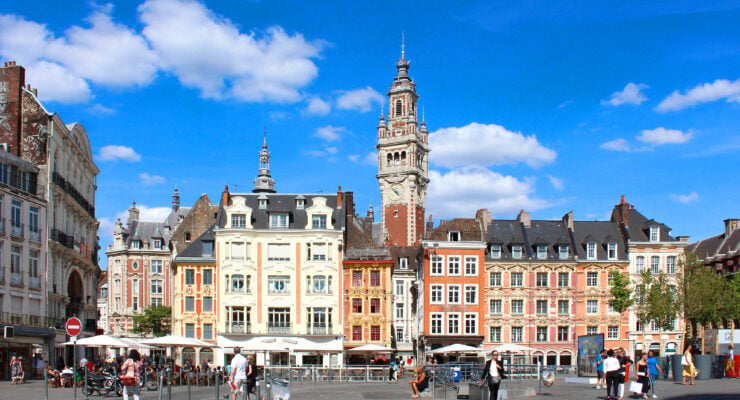Finding housing is never a walk in the park, and in France it’s no exception. This is even more true in its major cities, where competition is high. Landlords and agencies ask for a bunch of documents that most working holiday makers aren’t able to provide, and so you may be left wondering whether it’s even possible.
The short answer is yes, it is possible. In this article we’ll walk you through everything that you need to know about securing long term housing in France as a WHV holder.
1. Prior to arrival in France
Before you board your plane to France, you need to make sure that you have somewhere to sleep for at least your first few nights. We recommend you plan for housing for 2-4 weeks.
The easiest temporary accommodation to secure is Airbnb or hotels. However, they are also the most expensive. The booking process is simple and no different from that of any other country, so we won’t go into more detail.
For a cheaper option, stay at a youth hostel. France (Europe in general) has a large selection of hostels. Many offer both mixed and women-only dorms. Hostels are also a great way to meet people from all over the world and get tips from seasoned travellers. There is usually a communal kitchen where you can prepare simple meals.
2. Types of long term housing
During the couple of weeks of temporary housing that you’ve booked, your priority should be to secure long term housing ASAP. The first decisions you’ll need to make are:
- Live alone or with flatmates (colocation): living alone is obviously more expensive, but perhaps more comfortable.
- Furnished (meublé) or unfurnished: furnished is the easiest option for working holiday makers, since you can move in without having to buy a bunch of furniture. The difference in rent is small (10-15%).
The next thing you should consider is what part of town you prefer. If you don’t have a preference, at least do some basic research on what areas are higher risk. For example, in Paris, neighbourhoods to the north of the city as well as those around major train stations (gares) tend to see more crime or homelessness. You may also want something that is within walking distance of public transportation.
To give you an idea of what the cost is, the floor price for tiny studios (or a room in a house-share) in Paris is about €600-700. This is the lowest bracket. If you want a one-bed apartment to yourself or something nicer, it will be easily more than €1000. If you look outside city limits, there can be cheaper deals.
Everywhere else in France (maybe with the exception of Nice) is cheaper.
3. Where to look for listings
There are two main methods to finding housing: either you ask a housing agency to do so on your behalf, or you do everything on your own.
If you prefer the first option, contact a couple of agences immobilières in your city. Ask them if they take on foreign clients, what kinds of documents they require, and what the fee structure is. It might be something like €12 per sqm, for example. If you’re satisfied with the response, then you can proceed to discussing your detailed criteria with them.
If you do the search yourself, here are the most popular resources:
- SeLoger – housing site based in Paris but has listings all over the country
- Leboncoin – popular online marketplace for housing and other objects for sale
- Lacartedescolocs – specializes in house-shares. Many listings are managed by current tenants rather than landlords or agencies.
- Facebook groups for housing
Message listings that match your criteria by introducing yourself and asking when you can visit. Personalize the message a bit by putting yourself in the shoes of the person who wrote the listing. Don’t hesitate to message multiple listings at once, since some of the listings may already be no longer available.
If you are only looking for medium term housing (e.g., ~3-6 months), you can also consider subleases (sous-locations). These are basically where the existing tenant is looking for someone to take over their lease for a certain duration (e.g., if they need to be absent from the country for a few months). These generally require less paperwork since you’d be dealing with the current tenant rather than the landlord. Subleases can be found on all of the above sites, but especially in Facebook groups.
Rent prices may or may not include utilities. If they are included, the apartment is charges incluses.
In France, the layout of homes is described a bit differently.
- T1: one room (living room/bedroom) with a separate kitchen and a bathroom.
- T2: two rooms, i.e. one bedroom plus a living room.
- T3: three rooms. i.e. two bedrooms plus a living room, kitchen and bathroom.
- T4: three bedrooms with a living room or four bedrooms without a living room.
- T5: four bedrooms.
The bail solidaire (joint tenancy) guarantees full payment of the rent to the landlord, whatever the circumstances. So if one of the roommates doesn’t pay the rent, the others will have to cover it no matter what.
The bail non solidaire (tenants in common) simply requires each roommate to pay their share. If one of them doesn’t, the others are not affected.
4. The application process
Landlords in France generally ask for the following categories of documents:
- Photo ID (passport)
- Proof of address in France (e.g., proof of rent payment for last 3 months)
- Proof of employment status (e.g., work contract, student status)
- Proof of resources (e.g., your 3 recent pay stubs, or those of your guarantor)
As you can see, everything besides the passport is likely to be complicated for a WHV holder to provide. You probably don’t have a job, a pre-existing fixed address in France, or a French guarantor. And as an unemployed person, it’s not quite enough to just show that you have a bunch of savings in your bank account either because landlords like to see steady monthly income.
So as a foreigner in France on a WHV, is it even possible? The answer is yes, it is possible. BUT you will need to find a landlord who is flexible with his requirements. Explain your situation and vouch for your trustworthiness. Be prepared to show your bank statements, your rent receipts from back home, your resumé, your parents’ information as foreign guarantors etc. If you have a close friend or family member in France already, ask if they’d be willing to be your guarantor.
The exact documents will differ from landlord to landlord, but the overall idea is to show whatever you can to prove that you will be a reliable tenant. Afterall, the standard requirements of typical French applicants are not requirements inscribed into law, so it all comes down to negotiation and personal trust.
It certainly wouldn’t hurt if you had one, but even then it would take some time for you to accumulate 3 months’ pay stubs. It is possible to find long term housing without a job. The key is to just find an understanding landlord. Read the testimonials below to learn more.
If you don’t have a French guarantor, some people might tell you to just use the governmental service Visale as your guarantor. Unfortunately WHV holders aren’t eligible, because registration requires you to provide impossible documents such as student status or receipt of unemployment benefits.
5. Testimonials from previous WHV holders
Every working holiday maker’s experience looks different when it comes to the house search and application process. Read these stories for tips on how to maximize your chances of getting a yes.
I visited three apartments in Lyon before finding the right place and I increased my budget each time because the higher the rent, the less competition there was. I had to leave a deposit and provide all my paperwork from Canada (yes, it’s completely ridiculous). But I think it helped that my manager knew the rental agency. If I had to do it all over again, I’d go for shared housing. It’s a more practical option for the first few months, it’s less restrictive and definitely less expensive.
I used the pap.fr website and I eventually found an empathic soul who took the time to review my situation instead of turning me down because I didn’t have a rental history in France. I submitted many, many applications before getting a reply. Meeting the landlord and explaining your situation are key. I asked my employer to be my guarantor and that helped too.
I arrived in Bordeaux last October as a Working Holiday visa holder and finding housing was tricky, even though I had a job. Ultimately, it took me almost 2.5 months to find a place—granted, the market is tight in Bordeaux. My advice would be to focus on ads posted by landlords themselves and meet them to explain your situation. If possible, a French guarantor and a work contract help a lot too.
I rented a room for a month through Airbnb when I arrived in Lille. I visited a total of four apartments in four weeks. It was hard to get a positive reply because I arrived at the start of the school year and many students were also looking for a place to live. The third visit was a success. My landlady, who is also my roommate, didn’t ask me for any documents. I was quite surprised. I didn’t even have a job at the time. She simply trusted me to pay my share of the rent on time. I had to stay an extra week in my Airbnb until my room was available. My host offered me the extra week for free.
I arrived in Paris without a job or a guarantor. Thankfully I was able to find a landlord that was very flexible with his requirements. He accepted me even though I didn’t have all the standard documents that local French applicants would. It turned out that he lives abroad in Dubai, so he lets his other tenants (my current roommates) handle most of the decisions themselves. Read the full story.
6. Tenant rights and responsibilities
Even as a WHV holder, you have tenant rights. Here are a few of them most important ones:
- You have the right to accommodation that is in satisfactory condition. Your landlord is responsible for major repairs and maintenance work, both in the apartment and in the building’s common areas.
- You must be informed of any change made to the rental contract, such as the monthly rent.
- The documents provided, such as the lease, must be available to you free of charge.
- You are free to furnish and decorate the property.
You will find more information about tenants’ and landlords’ rights and obligations on the website (French only) of the Agence Nationale pour l’Information sur le Logement (ANIL).
WHV holders are not eligible for housing subsidies from CAF.
Security deposit
You’ll be required to pay a deposit after signing the rental contract. The amount required may not exceed two months’ rent, excluding utilities. This amount cannot be increased during the lease term or at renewal.
When you move in, the landlord and you will complete a move-in inspection (état des lieux d’entrée) to check the condition of the place. Make sure to write down anything broken, in bad condition, etc., otherwise, any pre existing damage will be your responsibility when you move out. At the end of the lease term, the landlord and you will complete a move-out inspection (état des lieux de sortie). The deposit will be refunded at most a month later if the place is in good condition.
Notice of departure
Your lease defines exactly how long you’ll be renting the apartment: one year, three years, or six years. You are allowed to terminate your lease early, but the notice period depends on your situation. For an unfurnished apartment in a designated high-demand area, the notice period is one month. Elsewhere, it’s three months. For furnished apartments, the notice period is one month. You can give notice simply by sending a letter to your landlord.
Unless you serve a termination notice at the end of your lease, the lease is tacitly renewed.
Renter’s home insurance
Renter’s insurance must be bought by either the landlord or the tenant. It’s optional for landlords but mandatory for tenants, so if your landlord opts out then you must get it. If you’re renting a room in a shared apartment, only one of the roommates has to get renter’s insurance for the entire place to be insured.
















 Français
Français English
English




0 comments
{{like.username}}
Loading...
Load more